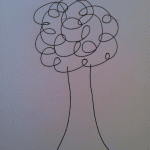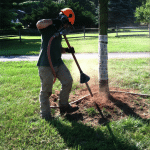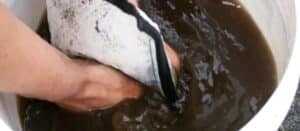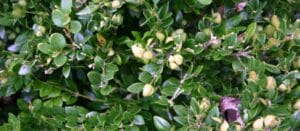As certified tree experts and arborists, all too often new customers ask us “Why is My Tree Dying? — What’s Killing My Tree?”
The #1 issue in tree health is OVER-MULCHING and IMPROPER PLANTING
You’ve probably seen many cases of over-mulching – otherwise called “mulch volcanoes”. You may have even done it yourself. But did you know that it could be the reason why your tree is dying?
Volcano Mulching Kills Trees

Over-mulched tree, referred to as “volcano mulching”
Unfortunately, we’re often called in to assess trees at a point when they are declining and in need of rescue. In our experience, over mulching and improper planting has become the #1 cause in the decline and death of many trees and shrubs in the central NJ and PA area.
There isn’t a horticultural book in print that would support volcano mulching, and yet it’s still done on a regular basis.
Why? Often mulch volcanoes are created simply because the homeowner or landscaper has seen someone else doing it that way.
But just because others pile mulch up around a tree doesn’t mean that it’s a good thing to do!
Problems Caused by Volcano Mulching

Girdling roots choke trees
Besides water and nutrients, roots need oxygen. When buried too deeply, a tree will push out new, adventitious feeder roots from the trunk closer to the surface in search of oxygen.
Sometimes these roots begin to encircle the trunk eventually girdling, or strangling, the trunk.
Excess soil and mulch right up next to bark also holds moisture, causing decay. If you’ve ever seen a fallen tree that looks like it’s been chewed off at the bottom, it’s likely due to a rotten trunk caused by too much mulch piled up around it.
Mulch volcanoes are also a nice home for rodents, giving them easy access to the tree trunk where they can cause extensive damage.

Effects of Mulch Volcanoes Over Time

Even Kindergarten students know that trees should flare at the base.
Remember drawing pictures of trees when you were in Kindergarten? Hopefully, it didn’t look like a telephone pole going into the ground, but rather the trunk flared at the base. That’s the look you should be going for with your trees.
Too much soil covering the root flare has the same effect as over-mulching.
Over time, mulch decomposes, raising the soil level. Although you may be applying only the proper depth of mulch each year, it will continue to build up year after year, eventually leading to an excessive amount of mulch and soil burying or covering the root flare.
Every few years before applying a new layer of mulch, it’s important to reestablish the proper grade level by removing excess soil so that the root flare is visible.
Solve the Problem With Root Collar Excavation (RCE)

Root collar excavation using an air spade
If a tree or shrub’s health is not declining too severely, you can save it by getting rid of all the excess soil and/or mulch. Proper soil grade can be re-established by excavating the root collar, either manually or with the use of an air spade (it’s much easier with an air spade!).
Deep root fertilization following RCE helps trees and shrubs rebuild their health by providing nutrients directly to the root zone where they can be taken up by the plant roots. Our organic liquid fertilizer blend differs dramatically from short-lived chemical variations, in that it feeds the soil as well as the plant. Mycorrhizae fungi and compost tea are also added to the blend, which improves new root growth, nutrient conversion and plant uptake.
Check Your Trees Today
As a homeowner, you have thousands of dollars invested in your landscaping. Unfortunately, hiring a nursery subcontractor does not always assure that your trees are being properly planted and mulched. At times, you may need to provide clear instruction to landscapers (specifically, “Don’t pile mulch around my trees.”).
There are many misconceptions about the proper way to plant and mulch trees so be sure you’re dealing with a certified Arborist or trained horticulturist who understands how to do it right. Improper planting just keeps mulch and nursery companies in business replacing dead trees.
For a complimentary tree assessment, call us at 908-309-6611, email us at info@OrganicPlantCareLLC.com or contact us online.
GET THE LATEST NEWS
Subscribe to the Organic Plant Care Newsletter and get timely and helpful tips and updates monthly.
There's no spam - we promise!





